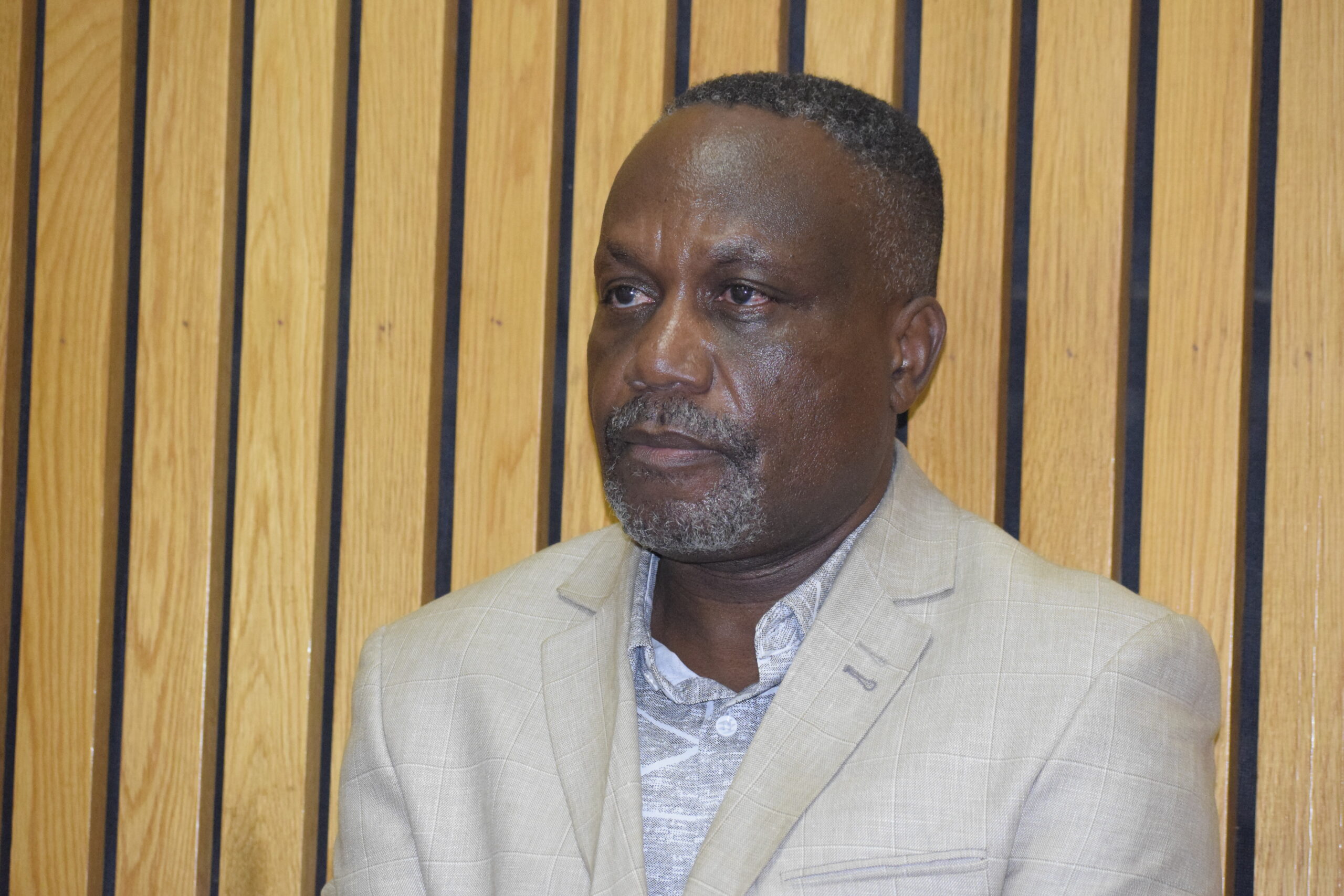
. . . explains how his shooters waylaid him and left him for dead
. . . says the injuries he sustained ended his journalism career
Mohalenyane Phakela
FORMER Lesotho Times and Sunday Express editor, Lloyd Mutungamiri, has been unable to practice his craft since his 9 July 2016 shooting by soldiers under the command of Tlali Kamoli.
Mr Mutungamiri said he has been unable to work because of the injuries he sustained and the trauma that he still suffers from the incident.
He vividly recalled the events of the 9 July 2016 fateful night, when he nearly lost his life, like they had happened just before his testimony before senior magistrate Peter Murenzi.
He told the magistrate he remains paralysed despite all the multiple surgeries that have been done on him ever since the event.
Mr Mutungamiri appeared before magistrate Murenzi at the start of the trial of four soldiers accused of shooting him.
His July 2016 shooting followed a rough week for this publication during which Lesotho Times staff, including publisher Basildon Peta, were interrogated by a team of heavily armed soldiers and police officers at the behest of Kamoli. Kamoli had been angered by the Lesotho Times’ reporting against his impunity and lawlessness which had plunged the country into more instability.
The Lesotho Times’ stories, apart from condemning Kamoli’s routine misbehaviour at the helm of the Lesotho Defence Force (LDF), had also focused on negotiations for his exit package after the Southern African Development Community (SADC) had recommended that he be dismissed as head of the army. Kamoli had also been angered by how he had been mocked by Lesotho Times satirical columnist, Scrutator.
Two days after Mr Peta appeared in court charged with criminal defamation of Kamoli, Mr Mutungamiri was shot as he entered his Upper Thamae home. One bullet broke two of his right-hand fingers and another shattered his lower jaw, requiring him to undergo specialised dental surgery and to remove the bullet lodged behind his left ear. He also sustained eye injuries after broken window glasses entered and cut his eyes, among other injuries.
The soldiers accused of his attempted murder are Rapele Mphaki, Khutlang Mochesane, Nyatso Tšoeunyane and Maribe Nathane. A fifth one, Mochesane Phusumane, was released in September 2019 after he opted to turn into a state witness.
On Monday, lead prosecutor, Rethabile Setlojoane, had asked the court to allow Mr Mutungamiri to testify virtually from his home country, Zimbabwe, because he feared for his life if he was compelled to appear in court in Maseru in person. However, the plea was successfully opposed by defence lawyers, Karabo Mohau KC and Letuka Molati, who demanded that Mr Mutungamiri appear in person. Arrangements were then made for his arrival and protection during his stay.
Mr Mutungamiri finally took the stand yesterday afternoon to explain his ordeal. He could not do so in the morning because the defence lawyers had demanded to be furnished with the copies of the Lesotho Times of around May and June 2016, especially the issue which carried the Scrutator article which had offended Kamoli and led to the shooting.
Mr Mutungamiri said he vividly recalled the fateful night of 9 July 2016 when he was shot by the suspects at the entrance of his Upper Thamae residence. He told the fully packed courtroom, while being led in evidence by Adv Setlojoane, that he saw four men near his home as he arrived after night duty.
“On 9 July 2016, it was a Saturday, and I had gone to work normally to do the Sunday Express which was due to be published the following day,” Mr Mutungamiri said.
“That day I was not using my usual car but the Toyota Vitz which I had bought for my son for his 18th birthday.
“We usually finished production work at around 3am the following day (Sunday) but that time we managed to wrap up early around 11pm on Saturday. I then drove home alone and when I was about to turn left at the corner of our then residence, I saw four men sitting on the nearby bridge.
“There were no streetlights, so it was dark. I stopped the car at the gate so that I could open it. The four men then started moving close to my car. I stayed in the car until they had passed it. At this point, they were walking in pairs — two ahead on the right side of the car and the other two on the left.
“I then stepped out of the car and opened the gate and got back into the car. I then noticed that they had turned and were coming back towards the car.”
Mr Mutungamiri said the men then started firing at him as he drove into his home while he shouted for help. He then fell unconscious after being hit.
“The car was now entering the gate when suddenly my head exploded. I realised that I had been shot on the right cheek. The bullet shattered my lower right jaw, broke several teeth and my tongue turned black — burned by the bullet. I have since then lost taste on that side of the tongue. The bullet was lodged below my right ear. I was also shot on the right hand and that second bullet broke bones in the hand as stated in the medical report.
“I could still hear gunshots at the time, and I was trying to shout to stop my wife from coming to the gate (just in case she was caught in the crossfire). However, I could not make any sound because the blood was going down my throat. I lost consciousness while still in the car and my head (as I was later told) got slammed onto the steering wheel.
“When I regained consciousness, my wife was there with a neighbour who had heard my wife crying for help. They then drove me to Maseru Private Hospital but along the way, I lost consciousness again. I woke up when someone was removing my t-shirt which was covered in blood.”
He said he was then ferried to Queen ‘Mamohato Memorial Hospital (QMMH) because they could not help him at Maseru Private Hospital. At QMMH he failed to get assistance either and was transferred to Mediclinic in Bloemfontein where he was eventually operated.
“I stayed for two days at QMMH, but I was told they could not operate me to remove the bullet because it was lodged in a critical position where there was a high possibility that I could get brain damage if they proceeded with the operation. On 12 July 2016 I was transferred to Mediclinic where I was still told that I could get brain damage if the operation was not successful. However, my family insisted on the operation even after being told about the risks.
“The operation (to remove the bullet) was successful but left the left side of my face still having problems. My left eye still twitches. The right side has lost the sense of feeling and remains cold. I was released with the instruction that I should return after two years to undergo jaw reconstruction. My family had stayed with me in Bloemfontein because we feared for our lives, and they could not have stayed behind in Lesotho. We then left for Zimbabwe (after release from hospital).
“I came back to Lesotho in 2018 to get funding for the reconstruction of my jaw. I am still undergoing reconstruction even now.”
Mr Mutungamiri said the shooting had ended his professional life. He has not been able to work as a journalist since 2016.
“I am a journalist by profession, but I have not been able to practice since my shooting in July 2016 due to the extent of my injuries,” he said.
The four accused soldiers sat calmly in the witness dock as Mr Mutungamiri unveiled his testimony. Between them and Mr Mutungamiri was a bench occupied by lawyers facing the magistrate. As Mr Mutungamiri narrated his ordeal, the soldiers had their faces glued to their notebooks in which they appeared to be jotting down notes. One of them, Mochesane, had his eyes fixed on Mr Mutungamiri.
Mr Mutungamiri will continue giving his evidence today in the Maseru Magistrates Court. He will afterwards be cross-examined by Advocates Mohau and Molati.
Commenting on the start of the trial, Lesotho Times publisher, Mr Peta, said it was all a big plus for Lesotho that those accused of shooting a journalist for simply doing his work had been arrested and arraigned before the courts.
“When people commit crimes, they should be held to account. That is the rule in any civilised society. We thank all the law enforcement agencies that have worked hard to get us to see this day. We hope the truth emerges and justice gets done.”






